

Ali Larijani, Secretary of Iran's Supreme National Security Council, stated on Tuesday that while the door to negotiations with the United States remains open, Washington’s demands make meaningful progress unlikely. His remarks came amid renewed tensions over Iran’s nuclear program, missile capabilities, and regional influence.
“The path for negotiations with the U.S. is not closed,” Larijani said, “yet these are the Americans who only pay lip service to talks and do not come to the table; and they wrongfully blame Iran for it.” He criticized what he described as “unrealistic and unattainable conditions,” specifically U.S. calls for restrictions on Iran’s ballistic missile program.
Earlier this year, U.S. President Donald Trump sent a strongly worded letter to Iran’s Supreme Leader Ayatollah Ali Khamenei, demanding not only that Iran abandon its nuclear program but also that it scale back its missile development and withdraw support for its regional allies. Tehran has rejected these terms as one-sided and incompatible with its security interests.
Larijani’s comments followed the decision by France, Germany, and the United Kingdom (the E3) to activate a “snapback mechanism,” potentially reimposing UN sanctions on Iran’s nuclear activities. The E3 urged Tehran to engage in negotiations with Washington to delay or suspend the measures for six months, but Iran has so far resisted, citing lack of trust and recent military actions against its infrastructure.
Tensions have escalated further since Israel’s 12-day conflict with Iran in June and subsequent U.S. strikes on three Iranian nuclear facilities. These incidents occurred during a period of indirect talks between Washington and Tehran, leading Iranian officials to demand firm guarantees against future attacks and compensation for damages sustained.
Last week, the foreign ministers of Iran, Russia, and China issued a joint letter to the UN Secretary-General and Security Council condemning the European trio’s attempt to reinstate sanctions. They labeled the move “legally baseless and politically destructive,” signaling that Moscow and Beijing are unlikely to support or comply with any renewed UN measures.